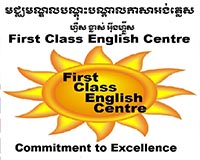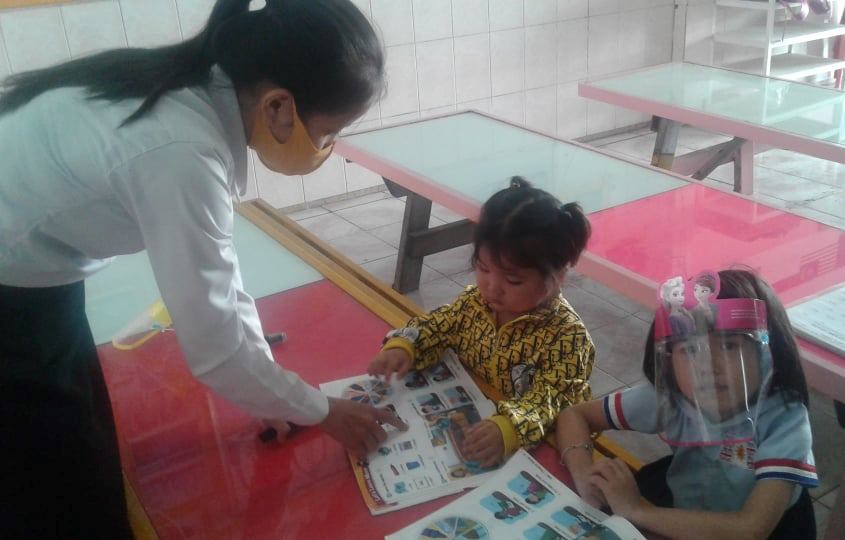First Class English Centre’s vision for education
Curriculum at First Class English Centre
Curriculum for early childhood education, primary school at First Class English Centre is based on curricula found in the best international schools. The assessment procedures employed at FCEC and examinations on subjects that are part of the curriculum. This includes the subjects to be offered and the syllabus for each subject.
FCEC curriculum encompasses:
• The provision of germane academic subjects that enhance the students’ general knowledge
• Development student ethos attending the school
• Ensure that the subjects and syllabuses are appropriate and relevant to the educational and vocational needs of the students
• Ensure that the amount of instruction time given to curriculum subjects is sufficient to allow for reasonable instruction in subjects
Content of curriculum
The school curriculum consists of 5 areas that are further divided into 11 subjects. These are:
• 1. Language: English and Khmer
• 2. Mathematics
• 3. Social, Environmental and Scientific Education: History, Geography, Science
• 4. Physical Education
• 5. Personal and Health Education
There are guidelines on the time to be allocated to each of the curriculum areas.
Aims of curriculum
The aims of the curriculum are to ensure that all children are provided with learning opportunities that recognize and celebrate their uniqueness, develop their full potential and prepare them to meet the challenges of the 21st century. The focus is on the child as learner, and the use of a variety of teaching methodologies is an essential feature of the curriculum.
The curriculum aims to foster the development of key skills in communication, problem-solving, critical thinking, inquiry, investigation and analysis, and social and personal awareness and interaction. In particular, it places key emphasis on the acquisition of literacy and numeracy skills.
The curriculum emphasizes the need for greater attention to be paid to students with special educational needs and emphasizes the importance of achieving functional literacy and numeracy.
The First Class English Centre curriculum celebrates the uniqueness of the child, as it is expressed in each child’s personality, intelligence and potential for development. It is designed to nurture the child in all dimensions of his or her life—spiritual, moral, cognitive, emotional, imaginative, aesthetic, social and physical.
The curriculum recognizes the integrity of the child’s life as a child and aims to cater for his or her needs and potential as they evolve day by day. By meeting these needs, the curriculum enriches the child’s life and the foundations are laid for happiness and fulfillment in later education and in adult life. A well educated student grows up to be an asset to the country; helping to make Cambodia stronger economically and socially.
The curriculum acknowledges that children live in and are a part of society, and that their personal development is deeply affected by their relationships in the home and with other people in society. The curriculum takes full account of these aspects of the child’s life in seeking to balance individual and social development, in developing an appreciation of how the different dimensions of life complement each other, and in helping the child to work co-operatively with others.
The relationship between education and Cambodian society is dynamic and interactive.
Education not only reflects a society but is an influence in shaping its development. It helps to equip children to share in the benefits of the society in which they live and to contribute effectively to that society’s sustenance and evolution. The curriculum reflects the educational, cultural, social and economic aspirations and concerns of Cambodian society. It also takes cognizance of the changing nature of knowledge and society and caters for the needs of individual children in adjusting to such change.
In order to realize this view of the child and education, the curriculum outlines a detailed and structured framework of content that is comprehensive and flexible. It promotes the active involvement of children in a learning process that is imaginative and stimulating. Its overall vision is to enable children to meet, with self-confidence and assurance, the demands of life, both now and in the future.
The general aims of First Class English Centre
This vision of education can be expressed in the form of three general aims:
• 1, to enable the child to live a full life as a child and to realize his or her
potential as a unique individual
• 2. to enable the child to develop as a social being through living and cooperating
with others and so contribute to the good of society
• 3. to prepare the child for further education and lifelong learning.
The curriculum recognizes the importance of developing the full potential of the child. It seeks to develop children spiritually and morally and to foster in each child an ethical sense that will enable him or her to acquire values on which to base choices and form attitudes; it endeavors to equip children with the knowledge and skills that will serve them not only in their lives as children but later as adults; it is concerned to develop their capacity for creative expression and response; and it promotes their emotional and physical development.
In Cambodia’s rapidly changing society effective interpersonal skills and communication skills are essential for personal, social and educational achievement. The ability to think critically, to apply learning and to develop flexibility and creativity are also important factors in the success of the child’s life. The curriculum places a particular emphasis on promoting these skills and abilities so that children may cope successfully with change.
An important goal of the curriculum is to enable children to learn how to learn, and to develop an appreciation of the value and practice of lifelong learning. The curriculum aims to instill a love of learning that will remain with the child through all stages of formal education and that will express itself in an enquiring mind and a heightened curiosity.
The principles of the curriculum
The First Class English Centre curriculum is based on a philosophy of education that incorporates the following five principles:
• 1. the full and harmonious development of the child
• 2. the importance of making due allowance for individual differences
• 3. the importance of activity and discovery methods
• 4. the integrated nature of the curriculum
• 5. the importance of environment-based learning.
.
The First Class English Centre curriculum affirms the view of the child and the learning process implicit in these principles and develops them. The principles of
the full and harmonious development of the child and of making allowance for individual difference are redefined in the broader concepts of:
• celebrating the uniqueness of the child
• ensuring the development of the child’s full potential.
The three educational principles dealing with activity and discovery methods, an integrated curriculum and environment-based learning are paramount.
The more important of these are:
• the child’s sense of wonder and natural curiosity is a primary motivating factor in learning
• learning is developmental in nature
• the child’s existing knowledge and experience form the foundation for learning
• the child’s immediate environment provides the context for learning
• learning should involve guided activity and discovery methods
• language is central in the learning process
• the child should perceive the aesthetic dimension in learning
• social and emotional dimensions are important factors in learning fea
• learning is most effective when it is integrated
• skills that facilitate the transfer of learning should be fostered
• higher-order thinking and problem-solving skills should be developed
• collaborative learning should feature in the learning process
• assessment is an integral part of teaching and learning.
10 Key issues in education
Issues of importance in education.
They include:
• 1. quality in education
• 2. literacy and numeracy
• 3. developing a sense of Cambodian identity
• 4. the place of the Khmer language in primary education
• 5. the spiritual dimension in life
• 6. both the Asian and global dimensions of modern living
• 7. pluralism, a respect for diversity and the importance of tolerance
• 8. the role of information and communication technologies in learning
• 9. the crucial role of early childhood education
• 10. the role of the curriculum in establishing effective lifelong learning habits

